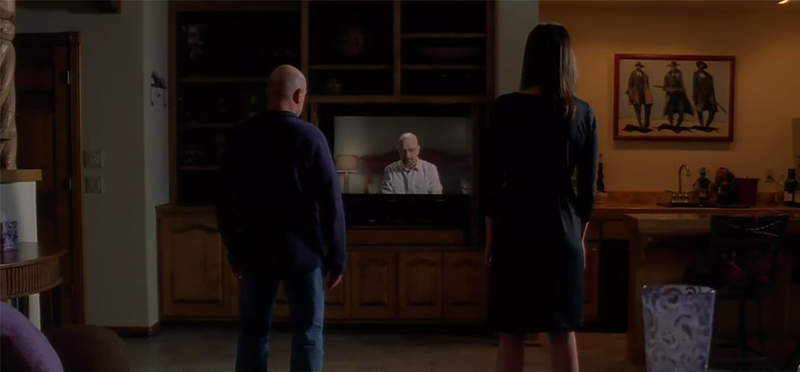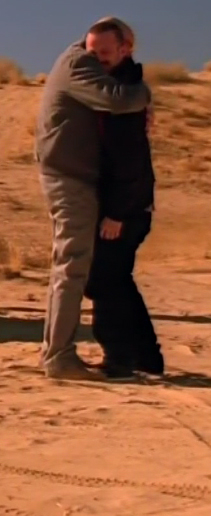Breaking Bad Breakdown: Title Tricking
 This week’s episode is entitled “Confessions.” As Jonathan Gray has discussed in his book Show Sold Separately, paratextual elements like episode titles help to shape viewer expectations and frame what is presented in the text. With a loaded title like “Confessions,” my expectations were elevated to insane levels, as I imagined all sorts of scenarios where, building off last week’s final scene, Hank gets Jesse to confess and turn on Walt, or Walt admits many of his hidden crimes to Skyler (or Jesse, or Hank), or Hank confesses his culpability in Heisenberg’s reign to the rest of the DEA.
This week’s episode is entitled “Confessions.” As Jonathan Gray has discussed in his book Show Sold Separately, paratextual elements like episode titles help to shape viewer expectations and frame what is presented in the text. With a loaded title like “Confessions,” my expectations were elevated to insane levels, as I imagined all sorts of scenarios where, building off last week’s final scene, Hank gets Jesse to confess and turn on Walt, or Walt admits many of his hidden crimes to Skyler (or Jesse, or Hank), or Hank confesses his culpability in Heisenberg’s reign to the rest of the DEA.
None of those things happened in the episode. While it featured many confessions, none were what we would have expected based on the title. This is what Breaking Bad does better than any series I’ve ever watched: create expectations and completely undermine them with twists that are more satisfying, compelling, and “Holy Shit”-inducing than anything I could have imagined. The title, coupled with last week’s final scene, was a little bit of trickery for viewers, setting up these expectations just to have Jesse shut Hank down quickly, but I forgive the series for how it deceived me because what it delivered instead was just so gloriously, deviously unexpected.
There were a number of confessions in the episode, but few were “true confessions.” Obviously the centerpiece was Walt’s fake video confession, the follow-through to his “tread lightly” warning to Hank. In a series full of jaw-dropping, mind-boggling moments of Walt’s immoral acts of deception and cruelty, this felt like one of the biggest. Even though there was no threat of physical violence, the video was just so brutal in how it threw Hank under the bus for all of Walt’s misdeeds, even though Hank has already suffered endlessly at his brother-in-law’s hand. The video served as preemptive retribution for Hank just trying to do his job, rather than in reaction to any actual questionable acts or lapses in judgment. The video forces Marie to make her own confession about Walt and Skyler paying for the medical bills, layering another level of shame and complicity upon Hank, who calls it the final nail in his coffin. And on top of what it did to Hank and Marie, the video felt like an almost boastful assertion of Walt’s mad skills as a liar, showing off how much of an immoral bastard he is largely just to strut his stuff in front of his hyper-macho brother-in-law who just a year ago, made Walt feel like less of a man.

This scene is also quite reflexive and playful. The video itself calls back to Breaking Bad’s pilot, which opens with Walt stating his name and address in his first self-shot video. Hank and Marie stand unmoving in total shock and disbelief, functioning as audience stand-ins, certainly accurately capturing the emotional reactions experienced on my couch. While we have watched Walt’s lies and manipulations for years, Hank and Marie are only seeing his true talents for the first time—and yet I was still dumbfounded that Walt could be this cruel and callous to his family members. Walt’s confession functions as a counter-narrative for the series, spinning a tale of a corrupt cop and desperate chemist caught under his spell that is much more plausible to anyone who has not been on this serialized journey, highlighting the unlikeliness of Breaking Bad’s actual story. Making the scene even more powerful, Breaking Bad’s regular cinematographer Michael Slovis directed the hell out of the episode, creating tremendous visual dynamism out of a sequence featuring two people standing still watching another still person on a television screen.
Walt makes another confession in the episode as well, when he admits to Walt Jr. that his cancer has returned. In what might be the most subtle surprise of the episode, Walt manages to manipulate a family member to do what he wants—in this case, keeping Junior from going to Marie’s house—by actually telling the truth. Obviously it’s not the whole truth, but he leverages his cancer to draw in Junior using honest emotions and legitimate familial concerns, and then forces Junior to make the decision that he needed him to make without resorting to his standard repertoire of lies. Of course, at this point in Walt’s devolution, the difference between lies and truths has become completely moot, as he says whatever is necessary to get what he wants, whether it’s the reality of his cancer or the petty lies about the soda machine that Skyler couldn’t care less about.
Walt’s inability to distinguish between lying and speaking honestly comes out in the desert scene, as Walt tries to convince Jesse to call the vacuum salesman and reboot his life. In a highly gratifying moment, Jesse calls Walt on his bullshit, asking him to provide a moment free of manipulation and deception. Walt responds with silence and a hug, prompting awkward confusion from Jesse. The ambiguity of the hug suggests that Walt just doesn’t know what to say honestly, responding with a hug that is neither real nor fake—he still feels some fatherly affection toward Jesse, but also needs to convince him to leave town. And Jesse’s request for honesty of motives is the one confession that Walt can never make, either to others or himself. So he embraces Jesse in a moment that layers silence with affection, condescension, contrition, and an implied threat.
Less of a confession than another statement of partial truths and strategic emphasis, the tease portrays Todd telling his uncle Jack and Kenny about the train heist. By notably omitting the story’s coda of killing young Drew Sharp, along with Todd’s fannish phone message to Mr. White, we see Todd’s own self-delusions and attempts to frame his role as swaggering thief and chemist, not heartless murderer. Todd’s two scene were the episode’s only weak links, although I fully expect that they are laying ground for something major to come, and I hope they’ll play better upon rewatch.
And most significantly for what is to come, Saul confesses his role in manipulating Jesse when Walt poisoned Brock, triggering Jesse’s gasoline-soaking rampage in Walt’s house. There has been some doubting among fans and critics that Jesse would have put the pieces together from Huell pickpocketing the pot, but I find it completely plausible—Jesse has spent months obsessively mulling over his own actions and picking at the threads of Walt’s lies, so it only took one extra piece of evidence to put it all together about Brock’s poisoning. Jesse’s desert confrontation over Walt’s lies and his realization of what Walt did (or at least, some of it) function as self-confession, finally admitting to himself what a monster his former partner and mentor truly is. Plausibility in Breaking Bad is less about the plot logic of cause and effect, than the character logic of emotional experience and motivation, and in this way Jesse’s revelation feels fully justified.
The larger character implausibility for me is that Skyler would go along with Walt’s video deception, as it seems like a step too far in aggressively confronting Hank and Marie. The fact that we see her trying to process what they’ve done, experiencing the type of regrets and doubts that Walt has long moved beyond, allows me to accept this leap, at least contingently until we see how it plays out. While many are suggesting that Skyler is now Walt’s equal in evil-doing, I think she is far from that—she has obviously made immoral choices, but she clearly regrets them and, like Jesse, is stuck in her own head wondering where things went wrong and what she could do differently. This is the key difference between Walt and most other characters who have broken bad: Walt never looks back at his crimes with regret and guilt, making him much more like Todd than Jesse or Skyler.
Next week’s episode is called “Rabid Dog.” Since a season three episode was called “Problem Dog,” named after Jesse’s therapy metaphor for how he killed Gale, my expectation is that Jesse is the rabid dog that Walt will have to put down. But because it’s Breaking Bad, it’s more likely that an actual rabid dog breaks into the house and bites Walt Jr.
Random Mobile Phones in a Drawer:
- The dinner scene is a perfect encapsulation of Breaking Bad’s tonal juxtaposition of intense emotional drama and ironic humorous counterpoint. The cheery waiter pushing guacamole on the feuding, fuming Whites and Schraders was one of the most Coen Brothers-like moments in a series full of them.
- Marie telling Walt to kill himself was stone cold awesome.
- Based on the video scene, I want to see a remake of Videodrome with Bryan Cranston playing Brian O’Blivion.
- Maybe it’s just because I’ve recently written about this with Homeland, but part of me thinks that a video like Walt’s doesn’t get made without being shared with more people than just Hank and Marie. Call it Chekhov’s Confession.
Paratext of the Week:
It’s gotta be Anna Gunn’s New York Times editorial decrying the misogynist vitriol directed at Skyler, and often Gunn herself. I won’t get into it here, but I’ve written some about this Skyler hate and I’m planning on expanding and updating that discussion at next year’s SCMS conference. While you’re at it, critic Maureen Ryan’s discussion of Gunn’s piece and how it’s part of a larger issue with TV wives and women is a must-read as well.



